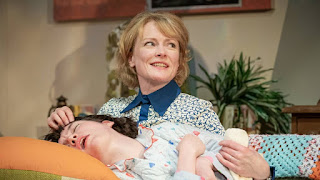Peter Nichols’ extraordinary play “A day in the death of Joe Egg” was shocking and controversial when it first appeared in 1967. Indeed, as the programme notes show The Lord Chamberlains office required cuts to some of the more salacious lines although today it is the language around Joe’s impairments that jars the most showing how attitudes to physical disabilities have changed over the years. Even the Cerebral Palsy charity which challenges remaining negative attitudes changed its name from the language used in this play. However, this revival feels so relevant and worthwhile because it both highlights these changes and shines a sharp spotlight on the impact on all members of the family adjusting to living with disability.
The play remains set in the sixties although it is only the disability language and the use of the 1967 song “Dear Mr Fantasy” by the band Traffic playing on a vinyl record player which starts and finishes the show that root it in that period. The highly theatrical staging by designer Peter McKintosh reflects the unusual structure of the play. We are constantly reminded we are watching a show and the first scene is played on the forestage with set markings on the floor highly visible and the back of the box set flats in full view. When the set spins to reveal the family sitting room it could be in any middle-class home. Throughout, with a loud click and change of lighting, actors break the fourth wall to address and challenge the audience often in long wordy monologues. The quality of the writing means we are amused, engaged and ultimately moved by these revelatory expressions of feelings.
It is the wonderful Toby Stephens, as the father Bri, who drives the story and who we first meet addressing an unruly class at his school in the opening scene. He conveys perfectly the sense of frustration he feels about his job, his marriage and his daughter, Jo and we see often his coping mechanism of using humour to deflect and hide behind. His relationship with his wife, Shelia, a delightfully understated Claire Skinner, is revealed when he returns home and we learn of her promiscuous past with a sense of guilt that it has given her and her obvious love and care from her daughter.
Storme Toolis plays the daughter Jo and movingly captures the physical impairments of the characters and touchingly gets to also speak out of character at the end of Act 1 again reminding us that this is a theatrical event but adding to its meaning and impact.

The play shows how others react to their situation in the second half when well-meaning Freddie (Clarence Smith) and his heartless wife Pam (Lucy Eaton) visit for an awkward but ill-judged intervention. As Freddie says, “I tend to raise my voice when I am helping people” and chilling talks of a “properly working child”.
When Bri’s mother arrives, the magnificent Patricia Hodge, bearing knitting and a strong west country accent the trouble really begins as it reveals the overbearing pressure, he has been bought up with that adds tension to his marriage.
This is a play that must be seen, and looks very strange on the page, but this production directed wonderfully by Simon Evans with a first-rate cast, makes it shine. Its relevant, funny, heart-warming and heart breaking all at the same time. It is a wonderful tribute to the late Peter Nichols and to all those families that have had to adapt and cope with similar situations.
Nick Wayne


No comments:
Post a Comment